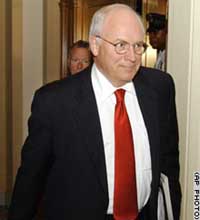Protesters, as well as prime minister, to greet Cheney on rare visit to Australia
U.S. Vice President Dick Cheney arrives in Australia on Thursday to thank one of Washington's staunchest supporters of the increasingly unpopular Iraq war an ally that has become a rarity by offering more, not fewer, troops for Iraq and Afghanistan.

Iraq and other security issues are expected to dominate Cheney's three-day visit and talks with Prime Minister John Howard, who is under increasing political pressure to set an exit strategy for Australia's 1,400 troops in and around Iraq.
The focus intensified Wednesday when the British government and other allies announced plans to start withdrawing forces from Iraq, leaving Howard to explain why he is not doing the same.
Opinion polls show the Iraq conflict is deeply unpopular among Australians, and anti-war demonstrations are planned outside venues in Sydney where Cheney is to speak or hold meetings. Police say peaceful rallies will be allowed but lawbreaking will be harshly dealt with.
En route from Japan, Cheney welcomed the British decision to hand security to domestic Iraqi forces and withdraw around 1,600 troops from southern Iraq over the coming months as "an affirmation of the fact that there are parts of Iraq where things are going pretty well."
On Monday, Howard said Australia would send another 70 military trainers to Iraq, adding fuel to an already fiery political debate about Australia's deployment. Howard has refused to set a timetable for the withdrawal of Australian troops, saying it would give terrorists a timetable to claim victory.
On Thursday, Howard said Australia was also considering increasing its contingent of 500 troops in Afghanistan. The Australian newspaper reported the Cabinet had given initial approval for up to 450 more troops.
Cheney is visiting Australia in part to explain Washington's surge of 21,500 more U.S. troops for Iraq as part of a strategy change to turn the tide in the four-year-old occupation, said Michael McKinley, an expert in U.S.-Australia relations at the Australian National University.
But he will also want to talk to Howard about North Korea, and probably Iran, McKinley said.
Australia, one of few close U.S. allies with any ties with North Korea, announced this week it will send diplomats to Pyongyang soon to start thawing relations that were frozen in 2002. The move was in response to a recent landmark deal on ending North Korea's nuclear programs.
Australia is also home to U.S. stations crucial to Washington's satellite intelligence network for Asia and the Middle East.
Cheney's visit would also lend some heavyweight support for Howard, who McKinley said had personalized the 55-year-old security alliance between the two nations by basing policy decisions on his close friendship with U.S. President George W. Bush.
"This is one of those intensive gardening exercises," McKinley said, meaning Cheney was tending the relationship on behalf of the White House.
Howard recently drew allegations of partisanship and an unwarranted incursion into U.S. politics by criticizing Democratic presidential hopeful Barack Obama's plan for withdrawing troops from Iraq.
Cheney is to give a speech Friday on U.S.-Australian relations.
Cheney and Howard are also expected to discuss David Hicks, an Australian former kangaroo skinner captured in Afghanistan in December 2001 who has been locked up without trial at Guantanamo Bay, Cuba, for more than five years.
Under growing public pressure, and with Iraq and Hicks looming as issues in elections due later this year, Howard has begun pushing U.S. officials to deal with Hicks' case more quickly, reports AP.
U.S. prosecutors say Hicks is likely to be formally charged with terrorism offenses within weeks, and a military commission is likely to be established within months to try him. Australian officials say they are examining whether he can be returned to Australia if the case is delayed much longer.
Subscribe to Pravda.Ru Telegram channel, Facebook, RSS!


